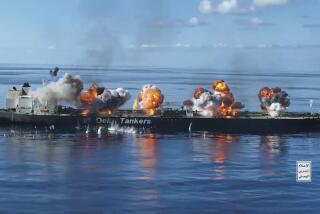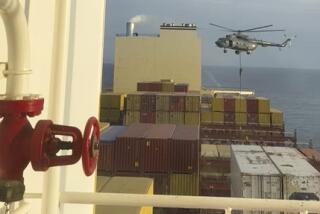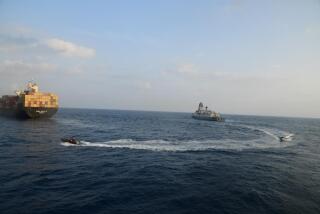At war with pirates on the high seas
- Share via
When pirates operating off the coast of Somalia started increasing their attacks on merchant vessels earlier this year, world leaders shrugged. When marauders captured a Ukrainian ship full of tanks and small arms in September, they sat up and took notice. On Saturday, modern-day buccaneers swooped down on what may be the largest ship ever captured by pirates, a supertanker carrying so much oil that news of its seizure caused a temporary uptick in world crude prices. Is it time to declare a war on piracy?
The capture of the Saudi-owned Sirius Star hundreds of miles off the coast of Kenya in the Indian Ocean is the maritime equivalent of a bull elephant being taken down by a hyena. The ship is the size of an aircraft carrier, with sides rising 33 feet from the water line, and is capable of carrying about 2 million barrels of oil. Though no details have emerged on how the pirates carried out the attack, which was announced Monday by the U.S. Navy, experts say the raiders probably used grappling hooks or ladders to scramble over the side, then took the tanker’s unarmed crew hostage. Other ships have thwarted such attacks using fire hoses, but just as elephants are seldom on the lookout for hyenas, the Sirius Star’s crew may have been caught napping.
Oil giant Saudi Aramco will probably have to hand over millions of dollars to ransom its ship and crew, but that’s not the most vexing thing about the attack. It comes even as international warships and private security contractors have been flocking to the Somali coast in response to the risein piracy, to little avail. Pirates have responded to the increased security in their usual hunting grounds in the Gulf of Aden by shifting farther southeast into the vast Indian Ocean, which is all but impossible to patrol.
What’s more, although NATO warships, the U.S. 5th Fleet and ships from Russia and India have been successful in overtaking pirate vessels, they’re seldom sure what to do with them. No country has yet been willing to try or imprison the captured pirates, who are often simply returned to their boats after their weapons are seized. That’s not exactly a powerful deterrent.
The real problem, naval commanders agree, is that piracy is the most lucrative thing going in Somalia, a war-torn failed state that has been without a functioning government (or much of an economy) since 1991. While stepped-up sea patrols can help, they say, what’s needed is more intervention on shore. History suggests they’re right; the notorious 17th century Tortuga buccaneers ceased their raids when career opportunities arose in logging and other Caribbean industries. There aren’t any easy solutions for Somalia’s many problems, but now that its woes are threatening world oil supplies, it seems a good time to start trying some hard ones.
More to Read
A cure for the common opinion
Get thought-provoking perspectives with our weekly newsletter.
You may occasionally receive promotional content from the Los Angeles Times.






